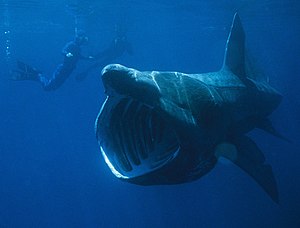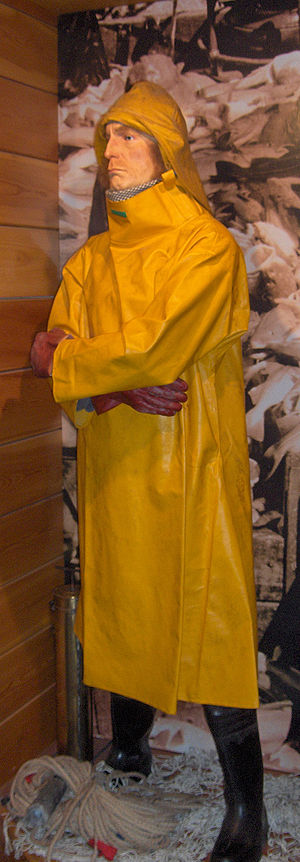 Image via Wikipedia
Image via Wikipedia
Memories of my grandfather bringing home fresh fish, and filleting them at the kitchen sink, then burying the heads and bones at the top of the garden where, early in my life, "Snowy" the cat had been interred after his death, and my grandfather saying, "Snowy would like that as he was always after the fish."
When he brought home crabs he would let them crawl about the floor, before he put them into a pot of boiling water, and the women in the house would scream if they moved in their direction.
Most of all was my journeys to the harbour where I could feast my eyes on the boats as they rocked gently at their moorings, ropes straining with the weight of them, as they slowly surged one way then another by the slight swell,charged by a moderate breeze blowing up river.
The sights and smells around the harbour, and the fresh salt tang of the sea, seemed so familiar to me, as if I had been through it all before, and it was calling me back.
All these experiences at a young age must have ingrained the salt in my blood, giving me the inspiration, and yearning to follow in the footsteps of my forefathers.
It should have been no surprise to my family, when, at the age of eleven, during the summer break from school, while playing with a friend, I suggested to him that we should take a walk down to the harbour, and I could show him the family fishing boat I always talked about.
We did tell our parents that we were off "exploring" as we called it when we intended to wander further from our houses, so they never gave it much thought when we disappeared.
On reaching the harbour (a half hour walk from home) the "Olive Tree" was already lying beside the quay with nothing much happening, so we climbed down two or three rungs of the ladders inserted into the harbour wall, and boarded the boat, only to be confronted by Frank (mentioned in earlier posts)who recognised me from my visits with my grandfather. (my grandfather being retired by this time and the boat skippered by my uncle Alex) He looked at us in a suspicious manner and asked what we were doing down here without an adult looking after us. Thinking I would put his mind at ease, I told him everything was OK, as our mothers knew where we were, then he told us they were going out to sea in a short while as the repairs they were in for were almost complete.
As it turned out they had a spot of engine trouble which was almost fixed, my uncle was in the engine room along with the rest of the crew and they were going out for ONE short tow to test everything was working OK.
GREAT! I thought to myself, this is the chance I had been waiting for, a trip out to the fishing grounds, and observe first hand what my future held in store, so I told Frank we were going out with them. Frank new better though, and told us we should go ashore, just as the engine sprang into life, and the crew appeared from below deck.
What has it got to do with him I thought indignantly, its our family boat, and he is just one of the crew, so I took my friend and stood at the far side of the wheelhouse where I thought we would not be seen, and watched the crew throw the mooring ropes off, setting the boat free to take me on my first adventure.
As my uncle put the boat astern we edged away from the harbour wall, and the excitement welled up inside me, but it was short lived as Frank spied us and shouted to my uncle that we were still on board. Peering out the wheelhouse window, and shaking his head, my uncle gave the boat a kick ahead to bring us back alongside the pier, where the tide was by now high enough to lift his two stowaways ashore, which he promptly did, telling me that I was too young just now but when I was older !!!!
My heart sank, and the rest of the words he tried to console me with did not penetrate my brain as my feet landed on dry land, having only moved a couple of yards away from where I now stood.
As the boat edged away again, its bow facing down the river I watched it gently dip into the slight swell as it headed out to sea, and with tears rolling down my face I turned away from my friend, trying to hide the hurt I felt inside, having let him down, but most of all the fact that they had sailed without ME!
So strong was my yearning to get to sea, that on the Sunday when we went to my grandparent's for dinner, I sat on my grandfather's knee, sobbing, when I told him, uncle Alex would not let me go out on the boat, an asked if he could arrange it for me.
In a sympathetic voice he told me that uncle Alex was the skipper now, and the decision was not his to make, but he assured me that when I was older, uncle Alex would take me out then.
It was little consolation to me at that time, but as you all know the story had a happy ending, and knowing what I know now, my uncle Alex was quite right not letting two innocent young boys go to sea with them, for more reasons than safety.
The fishing is a dangerous place to be, its rough, tough and things are said and done that little boys should never see or hear.................................. that would all come soon enough, when the boys became men.
![Reblog this post [with Zemanta]](http://img.zemanta.com/reblog_e.png?x-id=f24f54bc-0da3-4d4d-9766-8435a4c078ac)

![Reblog this post [with Zemanta]](http://img.zemanta.com/reblog_e.png?x-id=cfa79b2c-bbdd-4a5a-b4a2-34a9c5c73bf2)

![Reblog this post [with Zemanta]](http://img.zemanta.com/reblog_e.png?x-id=e545bd2a-89ab-480e-a1c1-cf2538bce44a)

![Reblog this post [with Zemanta]](http://img.zemanta.com/reblog_e.png?x-id=22e7eeb6-42c9-4726-8871-3e5a732f2935)

![Reblog this post [with Zemanta]](http://img.zemanta.com/reblog_e.png?x-id=b8190cd1-57fb-4683-b075-be79f16e6637)
